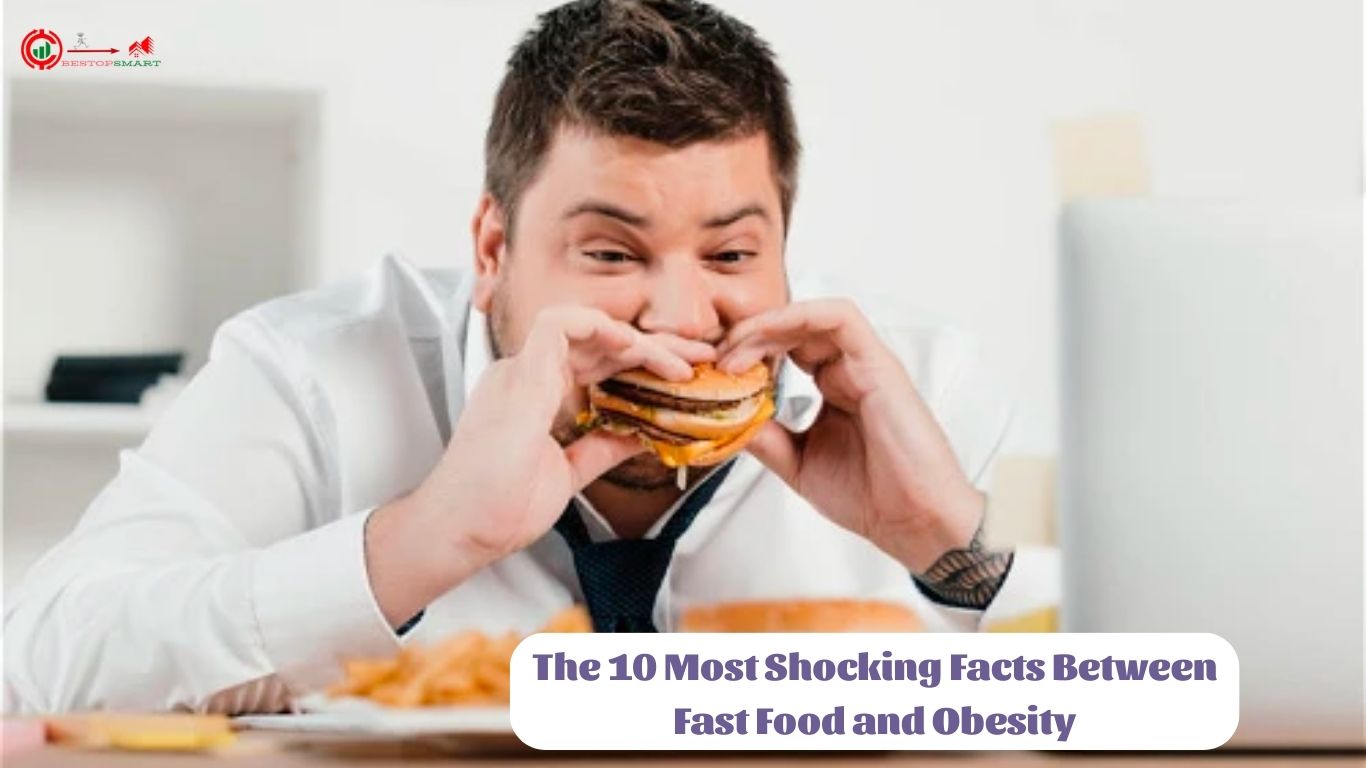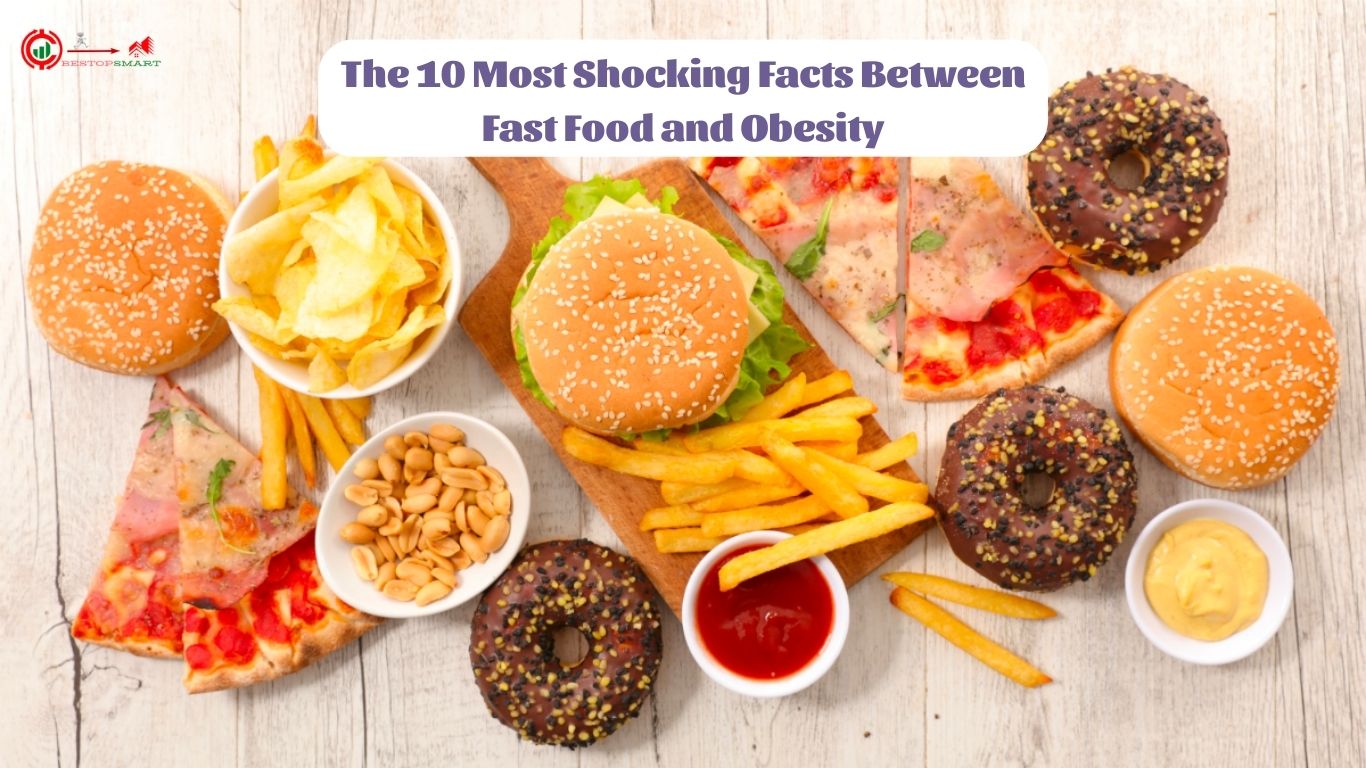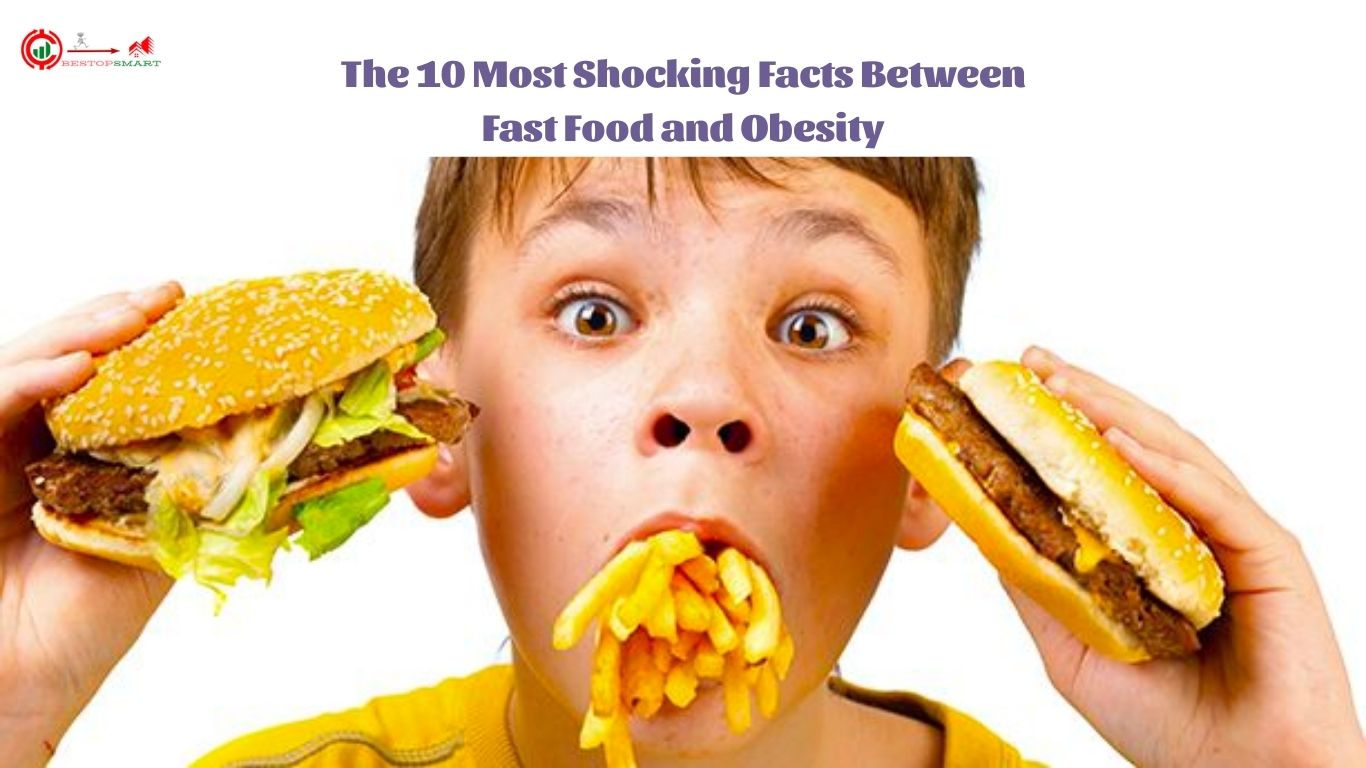Obesity and fast food are two topics that are frequently discussed together. Fast food is a kind of cuisine that is swiftly made and served at eateries or at drive-thrus. Fast food frequently causes weight gain and obesity. The ten most alarming facts concerning the connection between fast food and obesity are presented in this article by Bestopsmart.
Contents
- 1 The 10 Most Shocking Facts Between Fast Food and Obesity
- 1.1 Fast Food is High in Calories, Fat, Sugar, and Sodium
- 1.2 People Who Consume Fast Food More Than Twice a Week are More Likely to Become Obese
- 1.3 Fast Food Consumption is Associated with an Increased Risk of Developing Health Problems
- 1.4 Fast Food Portion Sizes have Increased Significantly Over the Years
- 1.5 Fast Food Marketing Targets Children and Adolescents
- 1.6 Fast Food is High in Trans Fats
- 1.7 Fast Food Consumption is Associated with a Higher Intake of Sugary Beverages
- 1.8 Fast Food Meals are Often Lacking in Essential Nutrients
- 1.9 Fast Food is Often Cheaper and More Accessible than Healthier Food Options
- 1.10 Fast Food Consumption is a Major Contributor to the Obesity Epidemic
- 2 Tips for making healthier choices and reducing fast food consumption
- 3 Conclusion
The 10 Most Shocking Facts Between Fast Food and Obesity
Fast Food is High in Calories, Fat, Sugar, and Sodium
Fast food is often high in calories, fat, sugar, and sodium. These ingredients can contribute to weight gain and obesity. For example, a Big Mac from McDonald’s contains 540 calories, 28 grams of fat, and 970 milligrams of sodium. This is more than one-third of the recommended daily intake for an adult.
People Who Consume Fast Food More Than Twice a Week are More Likely to Become Obese
Studies have shown that people who consume fast food more than twice a week are more likely to gain weight and become obese than those who consume fast food less frequently. This is due to the high calorie and fat content of fast food, as well as the large portion sizes.
Fast Food Consumption is Associated with an Increased Risk of Developing Health Problems
Fast food consumption is associated with an increased risk of developing health problems such as type 2 diabetes, heart disease, and other chronic diseases. These health problems are linked to the high calorie, fat, and sugar content of fast food, as well as the lack of essential nutrients such as fiber, vitamins, and minerals.
Fast Food Portion Sizes have Increased Significantly Over the Years
Portion sizes of fast food meals have increased significantly over the years. For example, a medium-sized soft drink at McDonald’s in the 1950s was only 7 ounces, whereas today a medium-sized soft drink is 21 ounces. This increase in portion sizes has led to overconsumption and weight gain.
Fast Food Marketing Targets Children and Adolescents
Fast food marketing often targets children and adolescents, contributing to unhealthy eating habits and obesity. Advertisements for fast food are often found on children’s television channels and during children’s programming, making it difficult for parents to control their children’s exposure to fast food marketing.
Fast Food is High in Trans Fats
Many fast food items are high in trans fats, which are linked to an increased risk of heart disease and other health problems. The 10 Most Shocking Facts Between Fast Food and Obesity. Trans fats are often found in fried foods, such as French fries and fried chicken, which are popular menu items at fast food restaurants.
Fast Food Consumption is Associated with a Higher Intake of Sugary Beverages
Fast food consumption is associated with a higher intake of sugary beverages, such as soft drinks and milkshakes. These beverages are a major contributor to obesity, as they are high in sugar and calories. A single can of soda contains around 140 calories and 39 grams of sugar, which is more than the recommended daily intake of added sugars for an adult.
Fast Food Meals are Often Lacking in Essential Nutrients
Fast Food and Obesity meals are often lacking in essential nutrients such as fiber, vitamins, and minerals. The 10 Most Shocking Facts Between Fast Food and Obesity. This is because fast food is often high in calories, fat, and sugar, but low in essential nutrients. For example, a typical fast food meal of a burger, fries, and a soft drink contains little to no fiber, vitamins, or minerals.
Fast Food is Often Cheaper and More Accessible than Healthier Food Options
Fast Food and Obesity are often cheaper and more accessible than healthier food options, making it difficult for people to make healthier choices. The 10 Most Shocking Facts Between Fast Food and Obesity. This is especially true in low-income areas, where fast-food restaurants are often more prevalent than grocery stores or fresh food markets.
Fast Food Consumption is a Major Contributor to the Obesity Epidemic
The 10 Most Shocking Facts Between Fast Food and Obesity: Fast food consumption is a major contributor to the obesity epidemic, which has significant social, economic, and health consequences. Obesity is associated with a range of health problems, including type 2 diabetes, heart disease, stroke, and certain types of cancer. In addition, obesity has a significant economic impact, as it is associated with increased healthcare costs and decreased productivity.
Tips for making healthier choices and reducing fast food consumption
The consequences of consuming Fast Food and Obesity on a regular basis are clear. However, making healthier choices can be difficult, especially for those who live in areas where Fast Food and Obesity are more prevalent than healthier food options. Here are some tips for making healthier choices and reducing fast food consumption:
Plan Meals in Advance: Planning meals in advance can help to reduce the temptation of fast food. By having a plan in place, you can ensure that you have healthy options available and avoid the need to rely on fast food.
Carry Healthy Snacks: Carrying healthy snacks such as fruits, vegetables, and nuts can help to curb hunger and reduce the temptation of fast food. This is especially important for those who are on the go and may not have access to healthier food options.
Drink Plenty of Water: Drinking plenty of water can help to reduce the temptation of sugary beverages such as soft drinks and milkshakes. Water is also essential for maintaining overall health and well-being.
Opt for Healthier Food Options: When eating out, opt for healthier food options such as salads, grilled chicken, and vegetables. Many Fast Food and Obesity restaurants now offer healthier options on their menus, so it is important to take advantage of these options.
Cook at Home: Cooking at home is a great way to ensure that you are eating healthy, nutritious meals. By cooking at home, you can control the ingredients and portion sizes, and ensure that you are getting the essential nutrients your body needs.
Conclusion
In conclusion, the link between fast food and obesity is clear. The 10 most shocking facts between fast food and obesity presented in this article highlight the negative impact of fast food on overall health and wellbeing. Fast food is often high in calories, fat, sugar, and sodium, and lacks essential nutrients such as fiber, vitamins, and minerals. It is also associated with an increased risk of developing chronic diseases such as type 2 diabetes, heart disease, and certain types of cancer.
Fast Food and Obesity are often cheaper and more accessible than healthier food options, making it difficult for people to make healthier choices. However, by planning meals in advance, carrying healthy snacks, drinking plenty of water, opting for healthier food options, and cooking at home, individuals can make healthier choices and reduce their consumption of fast food.
It is important to note that the information presented in this article is for educational purposes only and should not be construed as medical advice. If you have concerns about your dietary habits or overall health, please consult a medical professional. By making informed choices and taking steps towards a healthier lifestyle, individuals can reduce their risk of obesity and related health problems, and improve their overall health and wellbeing.








Leave a Reply